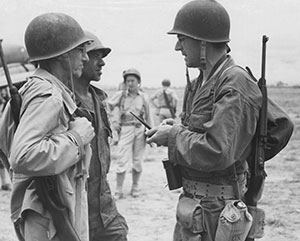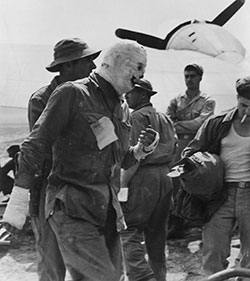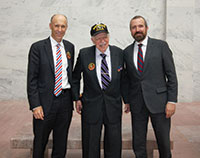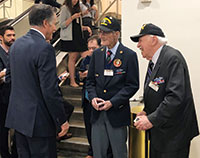
Honoring the unsung heroes of World War II
Merrill’s Marauders, the legendary all-volunteer jungle force, will receive a Congressional Gold Medal for their actions in Burma
From storming bloodstained beaches in Normandy to fierce island hopping in the Pacific, World War II is filled with astonishing accounts of ordinary Americans doing the extraordinary. But for their actions in Japanese-occupied Burma in 1944, some of the war’s lesser-known heroes are set to receive the nation’s highest token of gratitude: a Congressional Gold Medal.
Then-President Donald Trump signed legislation in October bestowing the honor on members of the Army’s secretive 5307th Composite Unit (Provisional)—known as Merrill’s Marauders after their commander, Brig. Gen. Frank Merrill. Of the more than 3,000 volunteers in the outfit’s three battalions, only nine members are known to be alive today.
One surviving member, Russell Hamler, was itching to jump into World War II when he joined the Marauders. Little did he know that decision would bring him halfway around the world to Southeast Asia and deep behind enemy lines.
“The only thing they told us is that they were forming a special outfit and that the work would be dangerous,” said Hamler, a DAV life member of Chapter 7 in Whitehall, Pennsylvania. “That’s it.”
Equipped with only what they could carry on their backs or pack onto mules, Hamler and the other Marauders trekked their way through hundreds of miles of almost impenetrable Japanese-controlled territory, often blazing their trails by hacking through the dense and tangled jungle. Their mission was to clear the way to construct a key road linking their Chinese allies with a strategic path for hauling supplies.
Between being surrounded continuously by Japanese troops, exhausting marches in monsoonlike rains, a lack of sufficient nourishment, and endemic diseases like malaria and dysentery, there was no corner of the battlefield safe from peril.
Hamler took part in three of the five major battles fought by the Marauders in the grueling five-month campaign. But it’s the Battle of Nhpum Ga that still haunts him.
“I always remember the Japanese,” added Hamler. “They didn’t run away.”

He and the rest of the 2nd Battalion were surrounded during the 10-day battle. The trail leading up to the American position was a frequent target of Japanese mortars and artillery shells. Hamler was wounded in one of the enemy artillery barrages when shrapnel cut across his backside. A fellow soldier was killed just a few feet away when twisted metal and massive tree splinters cut him nearly in half.
For their efforts, the outfit earned a Presidential Unit Citation, a distinction reserved for military units that demonstrate “extraordinary heroism in action against an armed enemy.” In total, six Distinguished Service Crosses, four Legions of Merit and 44 Silver Stars were awarded. And every Marauder earned a Bronze Star.
Today, the Marauders are considered a precursor to the Army’s elite 75th Ranger Regiment, whose soldiers honor their legacy by wearing the Marauder patch as their unit’s crest.
The campaign to award a Congressional Gold Medal to the Marauders was spearheaded by Fred Eames, a partner with the law firm Hunton Andrews Kurth. He became involved after a fellow attorney met two living Marauders, Bob Passanisi and Gilbert Howland, in the Dirksen Senate Office Building on Capitol Hill.
“We do a lot with veterans and the military,” said Eames, “so when I started reading about Merrill’s Marauders, I thought these guys are just tremendous.”
As a former congressional staffer, Eames leveraged his legislative expertise while encouraging other firms to take up the cause pro bono. The initiative gained support from the U.S. Army Ranger Association, the Special Forces Association and the Association of the United States Army. However, Eames said the best advocates were the living Marauders and their families.
Although the bill has been signed into law, it will be years before the medal, which will reside with the Smithsonian Institution, is struck.
Howland, who was among the first to lobby Congress, told New Jersey-based Community News last fall that the medal “will now shine a light on that forgotten theater in the Pacific that was so crucial in defeating the Japanese.”
“Russell and his fellow Marauders answered when their nation called, enduring both the immediate and long-lasting hardships of war,” said National Commander Butch Whitehead. “It’s only right to honor these individuals for their tremendous service and sacrifice.”
Convincing Congress
Congress approved legislation in September 2020 granting Merrill’s Marauders a Congressional Gold Medal. Attorneys, nonprofit organizations and the Marauders themselves were instrumental in successfully advocating to recognize the members and legacy of the 5307th Composite Unit (Provisional).
 |
 |





